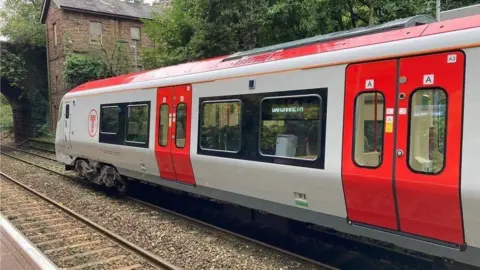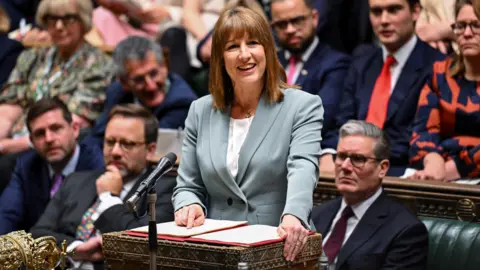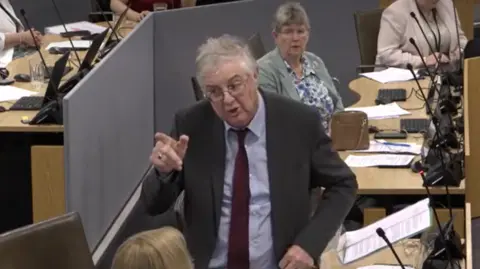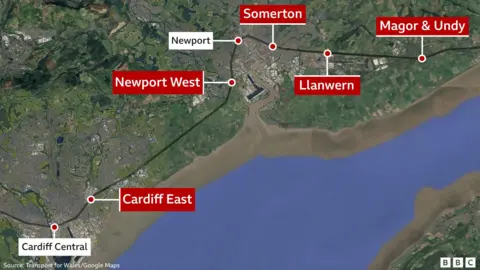New stations in £445m 10-year Wales rail plan
 BBC
BBCNew rail projects for Wales worth £445m were announced by the Labour Chancellor, Rachel Reeves, in her spending review on Wednesday.
The Treasury backed plans for five new stations in Cardiff, Newport and Monmouthshire, as well as upgrades in north Wales, with £348m to be spent between 2026 and 2030.
The rest of the cash will be spent over ten years. The announcement follows years of complaints from Welsh Labour of underinvestment in the Welsh railway network.
The chancellor told the Commons the whole funding package was over ten years - forcing Labour sources and a UK government minister to clarify that most of the cash would be spent much sooner than that.
Opposition politicians in the Conservatives, Plaid Cymru and the Liberal Democrats were scathing of the overall 10-year timeline, with a Tory spokesperson calling it a "disgrace".
Experts at Cardiff University said the announcements felt "underwhelming" after the Welsh government "apparently expended significant political capital in pushing the case".
The UK government said the package had "the potential to be truly transformative".
The spending review set out Reeves' plans for how public services will be funded for years to come.
It said the Welsh government, which spends cash on the NHS, schools and local government, will receive an additional £1.6bn each year on average.
The announcement follows weeks of rows between Welsh and Westminster Labour, as concerns grew over the next Senedd election with polling suggesting the party could lose its dominant role in Welsh politics.
According to the Treasury, the £445m will be spent on fixing level crossings, building new stations and upgrading existing lines, and is a combination of direct funding for schemes and cash for the Welsh government.
The projects backed include schemes that the Welsh Transport Secretary Ken Skates and others have lobbied the UK government for, originating from a range of transport reviews covering north and south Wales.
They include new stations at Cardiff East, near the city's Newport Road, and in the west of Newport.
There are hopes for a station in the eastern Newport suburbs of Somerton and Llanwern, and one that will serve the Monmouthshire villages of Magor and Undy, along with improvements to the mainline to allow local services to run.
The stations were proposed by a review to boost rail transport in a region that has seen an increase in house building in recent years, but is connected via the congested M4 motorway and has a limited local railway service.
The work is estimated to cost £385m over at least five years.
Improvements are also pegged for services in north Wales, including services between Wrexham and Liverpool.
 House of Commons/PA Media
House of Commons/PA Media'Cornerstone'
The Treasury called the cash the "cornerstone of the UK government's plan to address decades of underinvestment in critical infrastructure that has held back the Welsh economy".
In the Commons, the chancellor said: "I am pleased to announce today £445m for railways in Wales over ten years."
Reeves said the railway funding "was the difference made by two Labour governments working together to undo a generation of underfunding and neglect".
Documents for the review showed that £300m has been earmarked for mainline railway projects over four years - including the new stations and improvements to a junction in the west of Cardiff.
BBC Wales was told that the figure also includes £48m for the Welsh government's enhancements to the Core Valley Lines network, which is managed separately and makes up most of the Metro project in south Wales.
Around £90m is thought to be earmarked for work on a series of future projects over ten years.
 Senedd Cymru
Senedd CymruTorsten Bell, Labour Swansea West MP and a Treasury minister, denied that the cash was to be provided over a ten year period.
"It's not over ten years," he told the BBC, with the "vast majority going right away".
Asked if the chancellor was not clear enough, he said: "She was very clear that Wales was getting huge investment in rail."
Welsh Finance Minister Mark Drakeford remonstrated in the Senedd with the leader of Plaid Cymru when it was suggested in a debate that the £445m was over ten years.
After Rhun ap Iorwerth heckled that the chancellor had said it, Drakeford turned and pointed at him and said: "I am telling you. I'm the finance minister here. Would you like to listen to me?"
Rail funding has become a totemic issue in Welsh politics, with the lack of knock-on funding for Wales from High Speed 2 (HS2) repeatedly raised with First Minister Eluned Morgan.
The first minister has publicly called for more rail spending from the UK government - one of a list of calls she has made on Sir Keir Starmer in recent weeks.
Politicians say if HS2 had not been classified as an England and Wales project, Wales would be owed between £431m - according to Finance Secretary Mark Drakeford - or multiple billions, according to Plaid Cymru and previous sums used by senior Labour figures including Welsh Secretary Jo Stevens.
The extra money is not connected to HS2, although Labour was keen to make a symbolic link.
Prior to Wednesday's speech Labour sources had said the sum is more than Wales would have had from the high speed rail project.
It is not clear how they came to that calculation with the £431m figure having been an estimate of what the cash boost would have been up to this year - the spending review runs beyond that.
'Underwhelming'
The Wales Governance Centre of Cardiff University estimated the total loss from HS2 at £845m between 2016 and the end of the spending review in 2030.
It said: "Today's rail announcement through to 2034-35 apparently responds to an estimate of loss from HS2 that has already been rendered obsolete by the much larger losses that will be incurred by the end of this current decade.
"The Welsh government has apparently expended significant political capital in pushing the case for rail infrastructure investment in Wales. In that context, the announcements today feel underwhelming."
It said there was "no substantial detail" in the review on how the money would be spent.
Jo Stevens, the Welsh Secretary, said: "We promised we would deal with the historical under-investment in Wales' rail network and the funding announced today in this spending review shows we are delivering on that pledge."

What else is in the spending review for Wales?
The Welsh government will get an average of £22.4bn per year between 2026 and 2029, the UK government has said.
The documents say that the increase is slightly more than real terms, at 0.7%.
The money is used to fund Welsh public services, such as health and education.
The spending review confirmed that the Labour UK government's version of the replacement for European Union economic support will provide £211m for Wales each year from 2026 to 2029.
Wales Office Minister Nia Griffith said the new post-Brexit funding would be administered between the Wales Office and local authorities.
"Local authorities and ourselves will ensure that the money is used, but there will be an opportunity to talk to the Welsh government to ensure that our priorities come together."
Stevens said Wales had "protected our percentage share, and its cash protected".
Reeves also announced extra funding to help make coal tips in Wales safer.
The first minister has previously said that £25m allocated to Wales at last year's October budget was not enough.
Her announcement said £118m would be provided between 2026 and 2029.
A total of £80m has been earmarked to support floating offshore wind deployment in Port Talbot.
'Contempt'
Liz Saville Roberts of Plaid Cymru said confirmation of the 10-year timeline for rail blew "out of the water claims that this addresses the £4bn HS2 scandal".
"Wales should have received this funding - and more - long ago," said the MP.
A Tory source claimed the figure was "less than half" than what Wales received for rail during the Conservative government years.
Welsh Conservative Senedd leader Darren Millar said: "Today's rail spending announcement is an insult to the people of Wales.
"The previous UK Conservative government invested over £1bn in rail infrastructure between 2014 and 2024, and promised over £1bn more to deliver the electrification in north Wales."
Lib Dem MP David Chadwick said: "Labour's contempt for Wales just gets worse and worse.
"The indefensible choice to spread this measly amount of rail funding out over 10 years, not only robs Wales of what it is owed for past projects, but it also guarantees that we will keep falling behind in infrastructure spending indefinitely as major transport projects in England get the green light."
A spokesman for Reform UK, which is hoping to win its first Senedd members next May, said: "The £445m in rail funding announced today falls far short of what Wales is truly owed.
"After the financial disaster of HS2, a project that delivered nothing for the people of Wales, this gesture is little more than a token. It does not come close to addressing the decades of underinvestment our communities have endured."
Welsh Transport Secretary Ken Skates: "I'm delighted that they have confirmed huge investment today to improve rail infrastructure in Wales.
"Labour has delivered where the Tories wouldn't, where Plaid can't and frankly where Reform don't care to deliver."
Skates said the £445m figure was "more than we would have received to date in HS2 consequentials and that will pave the way for huge transformative projects in north wales and south Wales".
'Significant extra investment'
Labour's First Minister Eluned Morgan welcomed the spending review: "This spending review shows what can be achieved when governments work together.
"Wales will see significant extra investment in rail infrastructure, coal tips safety and Welsh communities will see real benefits that improve lives and create opportunities."
Another Labour source said the "historic investment" was down to the "work of the Welsh Secretary, Jo Stevens, who has delivered Labour's promise to right the chronic underfunding of Welsh rail by the Tories".
Former Welsh transport minister Lee Waters said ahead of the review: "Civil servants calculated that we lost out £431m in Barnett formula funding by the way the high-speed rail project was categorised by the Treasury. This £445m makes good on that."
He added: "Taken together this is a very significant package of rail investment, much more than we ever got from the Tories, and will make a real difference to people."
